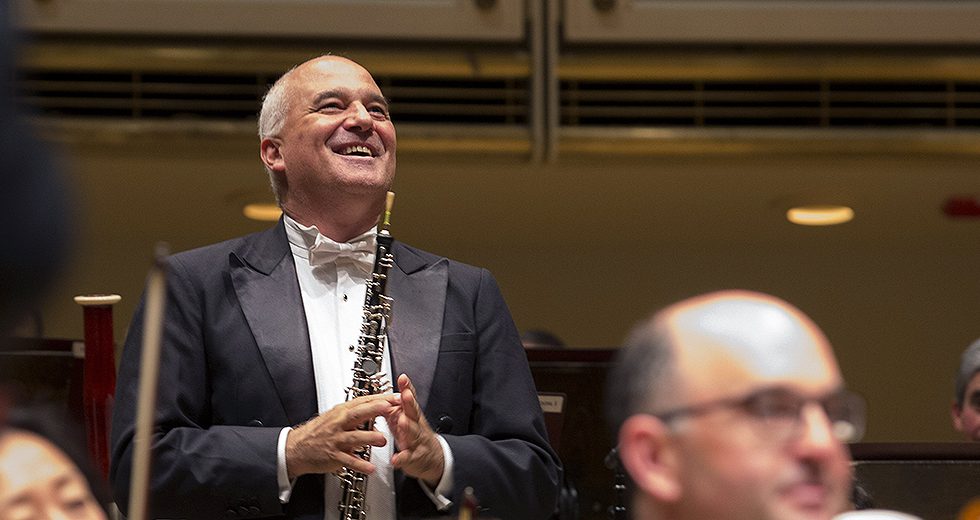
At the annual meeting Oct. 26 of the Chicago Symphony Orchestra Association, Alex Klein, holder of the Nancy and Larry Fuller Principal Oboe Chair, reflected on the CSO’s 125 years of tradition, and its enduring commitment to excellence. The oboist, who recently returned to the CSO after a 12-year hiatus triggered by a neurological disorder, has a unique perspective on the subject. After joining his fellow CSO musicians in the rondo from Mozart’s Oboe Quartet in F Major, K. 370, Klein addressed an audience of CSO trustees and staffers gathered in Buntrock Hall. The following is an excerpt from his remarks:
I used to be a former member of this orchestra and remain the only principal player to be hired twice … and in two different centuries.
This orchestra now celebrates 125 years of excellence. It was created to be a leading ensemble, and has done just that, uninterrupted, since its foundation. We’ve been through several wars, depression, recession, crisis, building reforms, 10 music directors and hundreds of carefully selected musicians, and through all of that, the Chicago Symphony never ceased to be recognized as one of the best orchestras in the world.
We thank each one of you for making this possible. Few cities in the world can count on this level of commitment to excellence. It doesn’t take only great conductors and musicians to maintain a world-class orchestra: It takes a village. It takes public attendance and value, and it takes an administration and board capable of taking the necessary steps — especially the courageous steps — to maintain greatness.
But how exactly do we select musicians to sit on this stage? Music is subjective, and so is the selection process. We want virtuosos and players capable of holding their own while sharing the stage with the top conductors and soloists in the world and [those] who would be quickly taken by other orchestras if we are not careful. But playing an instrument well is merely a task. No one who can simply type well can boast to be a writer. Mixing ingredients in the kitchen does not create a chef. We need to spot, often in a crowd of over 100 candidates, who is the person who has the ability to join the Chicago Symphony.
You have just heard our first hurdle: Mozart. The first thing every candidate needs to demonstrate in their audition is the ability to play works by this genius. Like a great book, Mozart’s music has layers. The candidate who is only a virtuoso will play the notes with great dexterity, in tune, clean, good tempo, but will leave us utterly bored. As you could hear a minute ago, Mozart also has hidden messages written between the lines — malice, if you will, sarcasm and provocative innuendos — that take a true artist to properly decipher.
From Mozart we dive into other works, always looking not only for a good instrumentalist, but for true musicians: people who can transform a sound into emotion and have the humility and camaraderie to join forces with similarly tuned colleagues. But playing good Mozart and a good audition is not enough. We have 125 years of tradition. I once heard from a board member who had been coming to our concerts since the 1930s that she could still hear the work of Frederick Stock in the sound of the CSO. We certainly have a lot of Reiner, Solti and Barenboim.
My first predecessor, Ray Still, was principal oboe for one third of the orchestra’s existence. Those of us who come into the CSO must pay heed to a particular sound tradition, and build on it. Those who can’t do it are discarded like a beautiful shoe that unfortunately doesn’t fit.
The interaction among these musicians and their conductors goes beyond music, but includes the city, the circumstances and history. On the oboe parts of Tchaikovsky’s Sixth Symphony, Pathétique, there is a curious marking, bracketed, asking for an English horn solo . . . well, Tchaikovsky did not include an English horn in the original orchestration. Why would a conductor include an superfluous instrument in the performance? As it turns out, that marking was made in the time of music director Frederick Stock, during the Great Depression, arguably in an attempt to justify the hiring of an extra musician to join the orchestra for a few concerts and thus embrace the community and its needs at a time of economic distress. Fred Stock not only helped feed that one musician in my section, but also strengthened the resolve of this orchestra to be always on the side of solutions and civic commitment.
As musicians privileged to be sitting on that stage, we bring to you our commitment to excellence second to none. I used to think I knew what great music was, having won international competitions and studied with the top teachers in my field. When I came to my first CSO rehearsal, it dawned on me what greatness really was. In the nine years that followed, I saw Daniel Barenboim hone the sound of this orchestra to even higher levels of perfection. And now, 12 years later, I played Mahler’s Fourth Symphony with the CSO and Maestro Muti this past April and was amazed at how much better the orchestra sounds. This is the fruit of our increasing devotion to play always a little bit better.
We thank you for this privilege to be here and be part of this monumental institution. And as good as this orchestra sounds now, let me promise all of you: You have not yet heard the best of us. We will play it even better next time.
TOP: Alex Klein takes a bow after a performance of Mahler’s Fourth Symphony in April. | Todd Rosenberg Photography 2016